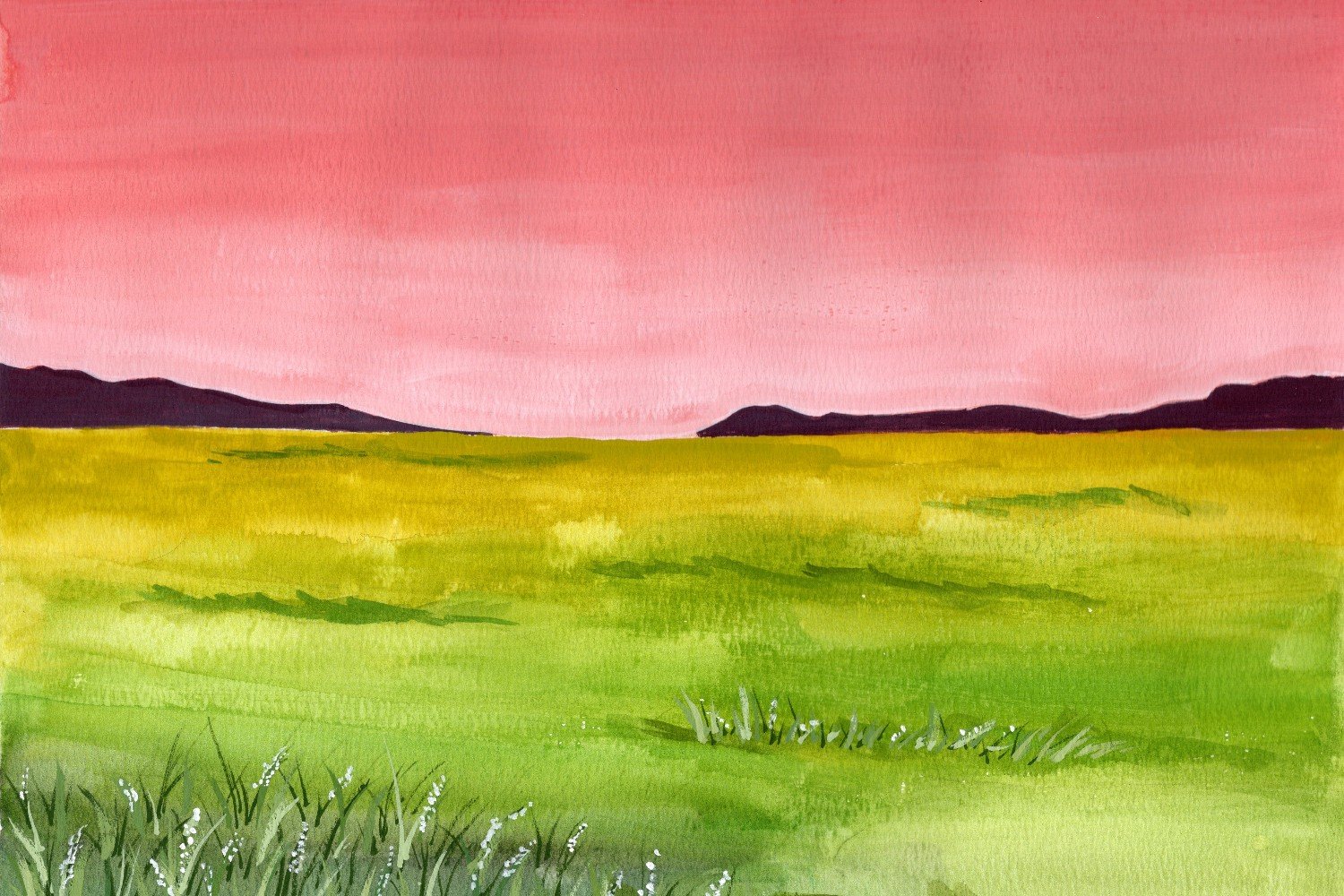Controlling How Others See Me
Watercolor of a blue crystal - painting and photo by me.
Recently, I was asked that since I describe my writing as being about "insights in healing personal challenges," what do I feel has been the greatest personal challenge as a theme?
I tend to have a hard time describing what I write about, but the overarching theme of my challenges has been learning who I am among all the voices (family, school, society, work, and even spiritual teachings) that tell me who I should be, and having the courage to be myself. It hasn't been easy. I've envied people — singers, artists, friends — who seem to be able to be themselves regardless of what others around them deem "normal." It's not like I'm wild in an obvious way, but I don't really do "normal": I married a guy thirty years older than me; I've never settled into a career because every job I've ever had drove me nuts; I want to understand why we're here and what makes us tick; I get off on analyzing and healing myself, a topic most people don't want to think about (although that's changing).
For years, my way of coping with being different was to stay silent. If I kept quiet, people couldn't criticize me. If I told people what they wanted to hear, I wouldn't stand out. If I didn't talk about the things I was really interested in, they'd think I was just like them. In some ways, this was just my natural way of relating by meeting people where they are, but I would also avoid talking about anything that made me different. I never felt the need to share who I was with people unless I'd determined that they were like-minded enough and wouldn't judge me. This worked for quite a long time.
But when I started writing again, this tactic backfired. If I wanted to share my thoughts, I had to show myself to everyone at the same time (at least, everyone who friended me on Facebook). I couldn't compartmentalize what my family could see, what my non-spiritual friends could see, what my former and current colleagues could see. I had to show myself to people who didn't normally see this side of me, and that has been really intimidating. My facades protected me for a long time, and it was hard to believe I'd be safe without them.
So much of my anxieties around writing had to do with what those from different parts of my life would think about these thoughts I've never shown them. Or those I've never met, but I've heard their voices on social media, in the news and magazines, and on internet comments. The idea of sharing my innermost thoughts felt like one of those dreams where I'm naked in public, and I'd run around looking for something to put on. That's what my earlier writing sessions were like. I would try to satisfy every imaginary criticism my brain could come up with. The end result was that my writing ended up stilted and lifeless, and that didn't work for me because I didn't return to writing so I could stifle myself in a different way.
Of course, how could I share my thoughts if I were afraid people would judge? Of course they would. You are probably judging right now—and by that I mean you are forming an opinion, not whether it's positive or negative. Forming opinions is what we do to navigate the world, and we use them to inform our actions. Other people's opinions can hurt emotionally, and sometimes even physically or materially depending on how they follow up those opinions with actions.
Compartmentalizing is not always a bad thing because opinions can hurt. It protects us when being ourselves can expose us to people who would use that information to judge, manipulate, or control us — whether well-meaning or not. As children, the opinions of our caretakers were everything because they had control over our lives. When adults don't react well to who we are (and let's face it, kids can be wild creatures), hiding, suppressing, and compartmentalizing become tools we use to get along.
As an adult with control over my own space and people I choose to spend time with, criticism is rarely threatening anymore, but it can still feel painful. I still anticipate criticism a lot more often than neutral or positive reactions, and I find my own faults a lot sooner than anyone else does. A lot of my challenges around self-expression have this fear of judgment at their core.
Of course, caring about what other people think is natural to us as social animals. It's what makes communities work, and people who actually don’t care are sociopaths. We are interdependent with one another, and caring about how others think is necessary for survival to a certain extent (as our younger selves knew). I certainly care about what my friends think, what my clients think, what my spouse thinks. At the same time, I'm not entirely dependent on them and can change friends, clients, or even spouses if we had irreconcilable differences (but that rarely happens, because I've gotten good at picking the right ones). Like fear, our caring can undermine us as well as empower us. So it's not that I want to stop caring, but I want to care appropriately.
Caring appropriately, as far as my internal dialogue goes, means distinguishing valid concerns from insults. When I'm writing, if a thought pointed out holes in my reasoning, those might be helpful suggestions that prompt me to rewrite a section. If a thought compared my work to someone else's and decided mine wasn't good enough, it may be right, but I can also see that as pointing me to where I want to be. If a thought was disgusted with my work and certain I'll never measure up, it's time to take a break and let it calm the. fuck. down. Which is not always easy.
Caring appropriately also means dealing with other people's judgments in real time, rather than in the past or future. Most of the time when I fear judgment, no one is actually judging me. I'm reacting to past criticisms and protecting myself from potential future criticisms. Instead of letting these imagined criticisms stop me before I'd even published a word, maybe I could let the response to my writing inform me whether anything needs to change. I could show it to a few trusted friends first and get feedback, although I have to be careful to be open to genuine feedback and not just seek praise, otherwise other people could be afraid to tell me the truth.
I think much of emotional healing is about re-parenting the younger parts of us that learned certain behaviors to protect ourselves, but those behaviors often stop working as adults when the threat no longer exists. They can inadvertently keep us from being our true selves and living the life that makes us happy.
There's no magic bullet to this re-parenting other than to keep learning, keep peeling away the layers, and keep gaining new experiences that prove to our younger selves that they no longer have to be afraid. I shared my writing even when it wasn't perfect, and my world didn't fall apart. People didn't suddenly stop being friends with me. My family—well, they haven't read it yet. I once thought my early blog posts sucked, but upon rereading recently, they actually didn't. Our brains can create these nightmarish scenarios that have us absolutely convinced they're real but make no sense at all in the light of day.
The only way I've found to relieve the fear of judgment has been to face it. This was usually the last thing I wanted to do, but eventually I did because what's on the other side was worth more than staying safe. The trick is to find the thing that's worth it, the thing you would walk through fire for and know that you have no other option. And by "no other option," I mean that you know in your heart that life would not be as satisfying if you didn't at least try.
There were countless times over the last three years that I had to remind myself to be brave. I had to dare to fail, dare to look bad, dare to be judged—and know that I'm still okay. I'm still here. It often felt like two steps forward, one step back. Now I can look back and see how far I've come. I'm a lot more comfortable sharing myself, even if there is still more work to do. I now know it's not an endless uphill battle, that there is an "other side" to this healing work, even if it's not always what I'd expected it to be.
Recent Posts
Thanks for reading! I’d love to hear what you thought of it. Feel free to comment below or on my social media accounts.
If you enjoyed this piece, please consider making a contribution so I can spend more time doing it. Your support is greatly appreciated. ❤️































